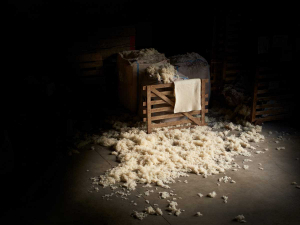Editorial: Happy days
OPINION: The year has started positively for New Zealand dairy farmers and things are likely to get better.
 Woollen knops can be used in a number of different products, including baby bedding and insulated clothing.
Woollen knops can be used in a number of different products, including baby bedding and insulated clothing.
New Zealand strong wool could bring a sustainable bounce back into soft upholstery – and woolgrowers’ bank accounts – through a new project seeking an alternative to synthetic fillers.
The Ministry for Primary Industries’ (MPI) Sustainable Food and Fibre Futures fund is committing $790,000 over three years to a project led by Wisewool aimed at increasing the market potential of woollen knops – the small, light fluffy balls used as a filler ingredient.
MPI director of investment programmes, Steve Penno says the project has the potential to improve returns to strong wool producers and provide an environmentally friendly alternative to existing products made from synthetic materials.
“Woollen knops can be used in baby bedding and insulated clothing, as well as mattresses, so it’s a versatile product with plenty of scope.
“Wisewool will also conduct research and development of needle punched wool blanketing, which can be used in residential and commercial furniture upholstery, insulation for the apparel industry, bedding, and futon markets,” Penno says.
He says one of the main drivers for the investment is the project’s potential to provide an alternative, high-value use for New Zealand strong wool.
“We’ve asked Wisewool to research consumer price preferences to see if the knops can be sold at a price that gives a good return to farmers.”
Wisewool chief executive Henry Hansen says the project will predominantly focus on working out the right components and blends to create a range of woollen knops for different products.
“We’ve discovered that when used in large quantities as a filler ingredient, woollen knops increase the bounce-back and compression resilience of the fibre,” Hansen says.
He says Wisewool will continue researching and comparing the compression resilience of both wool and synthetic fibres, and will adjust its carding machines to produce various wool knop blends.
“We’ll also conduct an environmental impact analysis and in-market testing.”
The World Wide Sires National All Day Breeds Best Youth Camp Best All Rounder plaudit has become family affair, with 2026 Paramount Cup winner Holly Williams following in her sister Zara's footsteps.
DairyNZ is giving New Zealand farmers a unique opportunity to gain hands-on governance and leadership experience within the dairy sector.
Herd improvement company LIC has posted a 5.2% lift in half-year revenue, thanks to increasing demand for genetics.
According to the latest Fresh Produce Trend Report from United Fresh, 2026 will be a year where fruit and vegetables are shaped by cost pressures, rapid digital adoption, and a renewed focus on wellbeing at home.
The Roar is a highlight of the game hunting calendar in New Zealand, with thousands of hunters set to head for the hills to hunt male stags during March and April.
OPINION: The past few weeks have been tough on farms across the North Island: floods and storms have caused damage and disruption to families and businesses.

OPINION: Meanwhile, red blooded Northland politician Matua Shane Jones has provided one of the most telling quotes of the year…
OPINION: This old mutt has been around for a few years now and it seems these ‘once in 100-year’ weather…